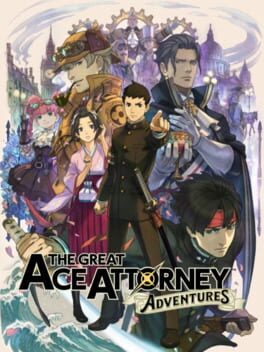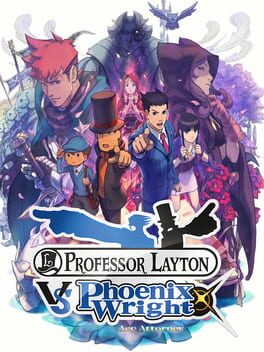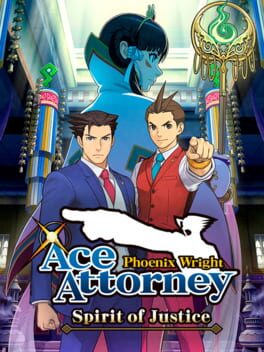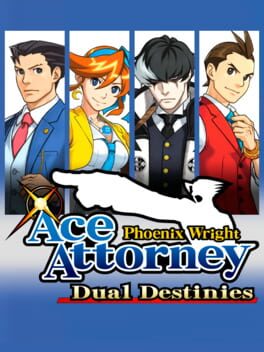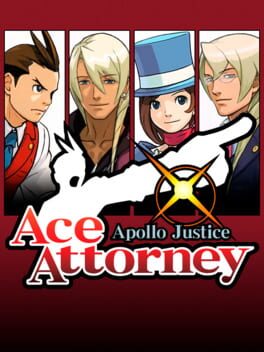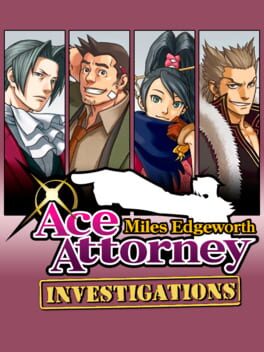j0s3phine0
Bio
i only play games when i'm energised.
🌕🌑🌑🌑🌑 --> Awful
🌕🌕🌑🌑🌑 --> Bad
🌕🌕🌕🌑🌑 --> Alright
🌕🌕🌕🌕🌑 --> Great
🌕🌕🌕🌕🌕 --> Outstanding
i only play games when i'm energised.
🌕🌑🌑🌑🌑 --> Awful
🌕🌕🌑🌑🌑 --> Bad
🌕🌕🌕🌑🌑 --> Alright
🌕🌕🌕🌕🌑 --> Great
🌕🌕🌕🌕🌕 --> Outstanding
Badges

1 Years of Service
Being part of the Backloggd community for 1 year
013
Total Games Played
000
Played in 2024
126
Games Backloggd
Recently Played See More
Recently Reviewed See More
This review contains spoilers
In my opinion, Spirit of Justice is a slight improvement over its 3D predecessor (Dual Destinies) thanks to its stronger focus and fluid graphics, but is really mixed in the grand scheme of Ace Attorney. The game is, in several aspects, good and does grant Apollo his much-needed closure, but falls flat in almost every other way. This is because it tried to offer more of what the fans wanted (for example, the game’s whole setting was made just to reintroduce Maya Fey from the trilogy), but completely fails at making that meaningful (using Maya as an example again, Spirit of Justice set up her grand return, but she only gets used as a cheap plot device in Cases 3 and 5) amidst other issues. Hence, the game doesn’t feel innovative despite its new setting, making Spirit of Justice passable at best.
The setting of this game is a major thing to review, before talking about its cases. It takes place in the fictional country of Khura’in, which is superstitious much like the trilogy’s Kurain Village from which it is based on. Because of this superstitious feel, most of the cases allude to or involve ‘spirit channelling’ (the act of letting dead people talk through a living person) also from the trilogy, meaning Khura’in is divisive for some fans (as some liked this concept in the trilogy while others didn’t). I don’t mind this new feel myself, but do take issue with how it’s a bit far-fetched at times; for example, Khura’in was said to hate lawyers, and I found it hard to believe a whole country would be against them. Even if the games are fiction of course, Ace Attorney was always somewhat sensical, meaning some of Khura’in’s story-building doesn’t feel legit and so doesn’t truly immerse the player. And this is quite an issue, since Khura’in and its customs are a huge part of the game.
Another thing to bring up here would be the ‘Divination Séance’ mechanic, which is new gameplay that shows a victim’s last few moments as you find video frames that contradict with statements below the Séance. In my opinion, this gameplay was strangely confusing, as finding the correct statement and video frame was too simultaneous. This addition to courtroom gameplay wasn’t improved by its bits of voice acting, either, which I found quite bad (especially that of the courtroom audience).
Technical faults aside, the real meat of the game is the case stories. But this, sadly, is where the game gets really mixed. On one hand, most of the cases are good in a way, with a popular one being Case 2 that finally gives Trucy Wright screen time (since she got none in Dual Destinies). It also built on the dynamic between the two newest members of the Wright Anything Agency (which is appreciated), while it has a good mystery paired with cool characters.
However, every other case has major gripes that overshadow otherwise good qualities— namely in Cases 3 and 5. Case 3, in my opinion, shines for world-building (thanks to its introduction of Khura’inese customs and societies like the ‘Defiant Dragons’) and how it plays on ‘show, don’t tell’ compared to the previous game (as other fans have pointed out, this is because Case 3 shows the bad effects of its main conflict— the ‘Defence Culpability Act’ —on the Khura’inese, as opposed to Dual Destinies which brought up its ‘Dark Age of the Law’ conflict through dialogue). As well, it shows character development of new character Rayfa (the princess of Khura’in), realising the ways of her country and what she knows are wrong, which is another example of Case 3 neatly showing, but not telling. This follows into the rest of the game, too.
Despite those perks, though, the case suffers from long investigation segments, and its raising of stakes (as Maya is your defendant here) wasn’t done well at all. Personally, I hated Maya being the defendant because this is not only an overdone trope in the trilogy, but even back then in mattered to her story and that of the trilogy’s; in Case 3, you could’ve swapped her role for anyone else and it wouldn’t have made a huge difference. They used her for the sake of bringing her back, which feels lazy. Plus, it’s not like you get to interact with her much, since she gets stuck at the detention centre. And because of that, Case 3 fails at using its fan-service meaningfully. Simply put, the little, good parts of Case 3 aren’t enough to win over the bad ones, especially when it’s basic stuff to follow (like ‘show, don’t tell’ or subtle character growth).
Case 5 suffers from that same issue of raising the stakes à la final case of Justice for All. This means Case 5 has Maya kidnapped and used as blackmail against Phoenix once more, as if he hasn’t learnt from this before. This only solidified the rehashing of tropes and crushing of character development in the game, adding to Case 5’s list of issues. Besides, Case 5 is notoriously long— not only for having two cases in one (when it could’ve easily been split in two likewise to Dual Destines’s finale), but because it shoved way too much lore (like the fact the previous queen of Khura’in ‘died from arson’) at the player, instead of distributing it across the game for a smoother pace. To make matters worse, Case 5 has an obvious and subsequently anti-climactic villain, adding to the sluggish feel of the story (since you take hours to expose her, when it’s already so obvious she’s guilty).
Another Case 5 issue worth mentioning is its handling of Nahyuta (the game’s main prosecutor) and his redemption arc. Up until this point, he’s been nothing but callous, showing no signs of gradual improvement. However, that changes when he disobeys the villain of Case 5 (who was blackmailing him) towards the end, yet this never felt satisfying. Again, this easily comes down to the fact Nahyuta never had signs of change until the end, unlike older-game prosecutors (such as Edgeworth from PW:AA, who changed his courtroom ways in Turnabout Samurai, right before you find out his backstory in the next case). Hence, Nahyuta’s redemption in Case 5 felt rushed and fruitless, not making up for his dislikability nor that of Case 5, for that matter.
But no matter how bad I made Case 5 sound in these last few paragraphs, Case 5 still has a great character that slightly redeems the case. His name is Dhurke Sahdmadhi, leader of the ‘Defiant Dragons’ (a group wishing to change Khura’in’s legal system) and Apollo’s adoptive father. Actually getting to investigate with him as Apollo during Case 5 really brought life to his character and why the player should care about him, seeing as he is both charming and Apollo’s saviour. Interacting with the character ultimately made the case’s big twist (of Dhurke being dead the whole time) really devastating. It makes the twist an instance you, the player, WISH wasn’t true. All in all, his character and the emotional twist he brought was the saving grace of Case 5. A lot of fans see it this way, and rightfully so. But unfortunately, it’s only one positive in a sea of negatives, meaning what was meant to be an ‘epic finale’ wasn’t much so.
The cases I failed to mention so far (Cases 1, 4 and the DLC case) have less to praise, or are just plain forgettable. Case 4, to start with, is honestly not great, but is a welcome filler case. It has a fun cast and reintroduces the quarrelling-sibling-like dynamic between Athena and Blackquill, but suffers from not allowing Athena independence over the case (when she never had much screen time in the courtroom) and an uncooperative defendant. And while it sticks to the ‘succession’ theme of the game as seen in the culprit’s motive, Case 4 feels awkwardly placed between Cases 3 and 5, both of which are much more content-heavy. The fact it sticks out like a sore thumb also makes it obvious it was only slipped in to make Athena ever-so-slightly relevant to the story, making the case out to be poor writing as the developers couldn’t include her in any other, meaningful way.
Likewise to Case 4, the DLC case has a unique concept but with subpar writing. For context, the case ties to time-traveling and involves the classic trilogy cast. Though this sounds great in theory, it’s forgettable in execution. I think this can be attributed to the mischaracterisation of trilogy characters (like how Edgeworth just came off meaner than usual), and especially how there were too little characters to the point you could tell who the culprit is based on the process-of-elimination alone. Besides that, the case isn’t necessarily bad for nostalgia-pandering, being separate from the main story (unlike the rest of the game), but more so for how it ‘plays it safe’ (as others have put it) and how that makes it uninteresting. On that note, Case 1 is also fine as most intro cases go, just with character gimmicks that get stale fast.
In conclusion, Spirit of Justice suffers from a lot of things, ranging from keeping the stakes too high and lengthiness to poorly-used fan-service and bad mechanics. These problems are enough to make it mediocre, but I should emphasise the Khura’in setting many take issue with might be a matter of preference; if you enjoyed the occult of the first trilogy, you might find yourself liking the game, and not so much if you never liked it. I, again, didn’t mind this factor and so it doesn’t weigh much into my rating, but only disliked it sometimes due to characterisation. Overall, the negatives of game outweigh the positives in quantity, even without touching on the new setting, forcing me to give Spirit of Justice a 2.5 stars.
The setting of this game is a major thing to review, before talking about its cases. It takes place in the fictional country of Khura’in, which is superstitious much like the trilogy’s Kurain Village from which it is based on. Because of this superstitious feel, most of the cases allude to or involve ‘spirit channelling’ (the act of letting dead people talk through a living person) also from the trilogy, meaning Khura’in is divisive for some fans (as some liked this concept in the trilogy while others didn’t). I don’t mind this new feel myself, but do take issue with how it’s a bit far-fetched at times; for example, Khura’in was said to hate lawyers, and I found it hard to believe a whole country would be against them. Even if the games are fiction of course, Ace Attorney was always somewhat sensical, meaning some of Khura’in’s story-building doesn’t feel legit and so doesn’t truly immerse the player. And this is quite an issue, since Khura’in and its customs are a huge part of the game.
Another thing to bring up here would be the ‘Divination Séance’ mechanic, which is new gameplay that shows a victim’s last few moments as you find video frames that contradict with statements below the Séance. In my opinion, this gameplay was strangely confusing, as finding the correct statement and video frame was too simultaneous. This addition to courtroom gameplay wasn’t improved by its bits of voice acting, either, which I found quite bad (especially that of the courtroom audience).
Technical faults aside, the real meat of the game is the case stories. But this, sadly, is where the game gets really mixed. On one hand, most of the cases are good in a way, with a popular one being Case 2 that finally gives Trucy Wright screen time (since she got none in Dual Destinies). It also built on the dynamic between the two newest members of the Wright Anything Agency (which is appreciated), while it has a good mystery paired with cool characters.
However, every other case has major gripes that overshadow otherwise good qualities— namely in Cases 3 and 5. Case 3, in my opinion, shines for world-building (thanks to its introduction of Khura’inese customs and societies like the ‘Defiant Dragons’) and how it plays on ‘show, don’t tell’ compared to the previous game (as other fans have pointed out, this is because Case 3 shows the bad effects of its main conflict— the ‘Defence Culpability Act’ —on the Khura’inese, as opposed to Dual Destinies which brought up its ‘Dark Age of the Law’ conflict through dialogue). As well, it shows character development of new character Rayfa (the princess of Khura’in), realising the ways of her country and what she knows are wrong, which is another example of Case 3 neatly showing, but not telling. This follows into the rest of the game, too.
Despite those perks, though, the case suffers from long investigation segments, and its raising of stakes (as Maya is your defendant here) wasn’t done well at all. Personally, I hated Maya being the defendant because this is not only an overdone trope in the trilogy, but even back then in mattered to her story and that of the trilogy’s; in Case 3, you could’ve swapped her role for anyone else and it wouldn’t have made a huge difference. They used her for the sake of bringing her back, which feels lazy. Plus, it’s not like you get to interact with her much, since she gets stuck at the detention centre. And because of that, Case 3 fails at using its fan-service meaningfully. Simply put, the little, good parts of Case 3 aren’t enough to win over the bad ones, especially when it’s basic stuff to follow (like ‘show, don’t tell’ or subtle character growth).
Case 5 suffers from that same issue of raising the stakes à la final case of Justice for All. This means Case 5 has Maya kidnapped and used as blackmail against Phoenix once more, as if he hasn’t learnt from this before. This only solidified the rehashing of tropes and crushing of character development in the game, adding to Case 5’s list of issues. Besides, Case 5 is notoriously long— not only for having two cases in one (when it could’ve easily been split in two likewise to Dual Destines’s finale), but because it shoved way too much lore (like the fact the previous queen of Khura’in ‘died from arson’) at the player, instead of distributing it across the game for a smoother pace. To make matters worse, Case 5 has an obvious and subsequently anti-climactic villain, adding to the sluggish feel of the story (since you take hours to expose her, when it’s already so obvious she’s guilty).
Another Case 5 issue worth mentioning is its handling of Nahyuta (the game’s main prosecutor) and his redemption arc. Up until this point, he’s been nothing but callous, showing no signs of gradual improvement. However, that changes when he disobeys the villain of Case 5 (who was blackmailing him) towards the end, yet this never felt satisfying. Again, this easily comes down to the fact Nahyuta never had signs of change until the end, unlike older-game prosecutors (such as Edgeworth from PW:AA, who changed his courtroom ways in Turnabout Samurai, right before you find out his backstory in the next case). Hence, Nahyuta’s redemption in Case 5 felt rushed and fruitless, not making up for his dislikability nor that of Case 5, for that matter.
But no matter how bad I made Case 5 sound in these last few paragraphs, Case 5 still has a great character that slightly redeems the case. His name is Dhurke Sahdmadhi, leader of the ‘Defiant Dragons’ (a group wishing to change Khura’in’s legal system) and Apollo’s adoptive father. Actually getting to investigate with him as Apollo during Case 5 really brought life to his character and why the player should care about him, seeing as he is both charming and Apollo’s saviour. Interacting with the character ultimately made the case’s big twist (of Dhurke being dead the whole time) really devastating. It makes the twist an instance you, the player, WISH wasn’t true. All in all, his character and the emotional twist he brought was the saving grace of Case 5. A lot of fans see it this way, and rightfully so. But unfortunately, it’s only one positive in a sea of negatives, meaning what was meant to be an ‘epic finale’ wasn’t much so.
The cases I failed to mention so far (Cases 1, 4 and the DLC case) have less to praise, or are just plain forgettable. Case 4, to start with, is honestly not great, but is a welcome filler case. It has a fun cast and reintroduces the quarrelling-sibling-like dynamic between Athena and Blackquill, but suffers from not allowing Athena independence over the case (when she never had much screen time in the courtroom) and an uncooperative defendant. And while it sticks to the ‘succession’ theme of the game as seen in the culprit’s motive, Case 4 feels awkwardly placed between Cases 3 and 5, both of which are much more content-heavy. The fact it sticks out like a sore thumb also makes it obvious it was only slipped in to make Athena ever-so-slightly relevant to the story, making the case out to be poor writing as the developers couldn’t include her in any other, meaningful way.
Likewise to Case 4, the DLC case has a unique concept but with subpar writing. For context, the case ties to time-traveling and involves the classic trilogy cast. Though this sounds great in theory, it’s forgettable in execution. I think this can be attributed to the mischaracterisation of trilogy characters (like how Edgeworth just came off meaner than usual), and especially how there were too little characters to the point you could tell who the culprit is based on the process-of-elimination alone. Besides that, the case isn’t necessarily bad for nostalgia-pandering, being separate from the main story (unlike the rest of the game), but more so for how it ‘plays it safe’ (as others have put it) and how that makes it uninteresting. On that note, Case 1 is also fine as most intro cases go, just with character gimmicks that get stale fast.
In conclusion, Spirit of Justice suffers from a lot of things, ranging from keeping the stakes too high and lengthiness to poorly-used fan-service and bad mechanics. These problems are enough to make it mediocre, but I should emphasise the Khura’in setting many take issue with might be a matter of preference; if you enjoyed the occult of the first trilogy, you might find yourself liking the game, and not so much if you never liked it. I, again, didn’t mind this factor and so it doesn’t weigh much into my rating, but only disliked it sometimes due to characterisation. Overall, the negatives of game outweigh the positives in quantity, even without touching on the new setting, forcing me to give Spirit of Justice a 2.5 stars.
For a game that is worth over $100 on eBay in-box, it's the weakest game in Ace Attorney and not worth all that much (I know it sold poorly in the US, hence the high prices, but still). Most of the cases range from bad like the third case, to tedious and mixed like the last one (this is a major let-down too, considering that Ace Attorney games are known for their great final cases). The overarching plot holds little emotional value to the player, unlike the trilogy, because it doesn't tackle something that is directly affecting characters we care about. In turn, this makes the cases unsatisfying to go through in a way. Despite all this, the game does introduce top-down perspective gameplay and 'Logic' phases, which I found simple, yet engaging for a visual novel. As well, there are some new characters in this game (among worse ones) that make it worthwhile, and this can also be said for a small part of its cases (namely the second and fourth ones), as they let you explore unique settings. Overall, this game is very mixed in terms of cases and characters and has a flawed story, which is why I gave it an 'mixed' rating of 2.5 stars. It might be weak in many areas, but still worth playing as part of Ace Attorney.
